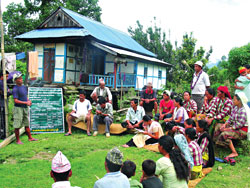 Almost one year after the royal takeover, Nepal's foreign donors are sending mixed signals about their future engagement in the country. That was evident at a recent donors' meeting at the United Kingdom's Department for International Development (DfID) headquarters here.
Almost one year after the royal takeover, Nepal's foreign donors are sending mixed signals about their future engagement in the country. That was evident at a recent donors' meeting at the United Kingdom's Department for International Development (DfID) headquarters here.
Some of those who participated had already slashed their assistance while others were reviewing the situation on the ground. Few have chosen to increase their aid.
The changing scenario has been the main concern for them all. "We are concerned if there will be a conducive political environment for donors to do their work properly and it applies to the government, king and also to the Maoists," says Stephen McClelland, head of the Asia Directorate at DfID headquarters.
"The interference in the development activity, whether from the Maoists or the security forces, makes it very difficult for the donors to do their job," he added.
Such apprehensions could be the main reason for the significant drop in aid this year, at least judging by the first half of fiscal year 2005-2006. Of the more than Rs 52 billion allocated to development, more than Rs 32 billion was expected to be drawn from a mix of foreign loans and grants. But after six months, just slightly over Rs one billion has arrived as foreign assistance.
Despite the various challenges and troubles discussed in the London meeting, the donors had one common stand: they were not walking away from Nepal. "That all of them decided to remain engaged was an important message," says McClelland.
That was when the Maoists' unilateral ceasefire was still in place. Now the truce is no more and the rebels have even started targeting Kathmandu Valley.
While the renewed full-scale conflict and violence has donors worried about how to implement projects, the government has a strong belief that next month's municipal elections are good news for development. "It has been difficult to spend the development budget because there is no local government. That is why we have been stressing local polls," recently appointed State Minister for Finance Roop Jyoti told us.
His immediate predecessor, Madhukar Shumshere Rana, believes the donors made a turnaround after King Gyanendra announced the polls last year. "Before, they had many issues to cite reservations about but once we announced the elections they have shifted their position and have become quite positive."
But most representatives of the donor community who we spoke to didn't agree. One of them told us privately, "The Election Commission has received not a single penny from any of the donors-that shows if the donor community supports the election or not."
The conflict has prevented many donors from monitoring their works on the ground, especially bilateral donors who are directly implementing their projects in rural areas. That is the reason why the donors have made it a point to highlight their Basic Operating Guidelines time and again, in which their employees' safety is given top priority. "If our staff's safety is compromised, then we will act accordingly," said McClelland referring to the undergoing review in DfID's engagement in the country.
The risk in sending staff on monitoring missions is what is keeping much of the donors' money unused. "In fact, this problem is getting more severe because most of the bilateral donors have not been able to send their staff to the field due to the conflict situation," says National Planning Commission Vice Chairman Shankar Sharma.
While the worsening situation has led to a decline in foreign assistance from most bilateral donors, officials say that aid from many multilateral agencies has increased. One example is the Asian Development Bank. "Not only has the bank released the assistance it had put on hold but it has also entered into new negotiations," a senior NPC official told us.
"The bilaterals can afford to talk about politics and they can take a political stand to decide about their assistance but we cannot," one chief of a multilateral agency told us.
The multilaterals and the bilaterals may have some differences about their operations today but both must face the uncertainty that renewed violence has once again posed.
Picture Caption: Despite international criticism against the February First move, humanitarian aid has remained intact. NARESH NEWAR


